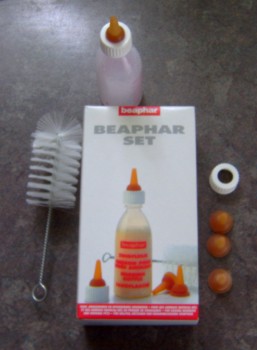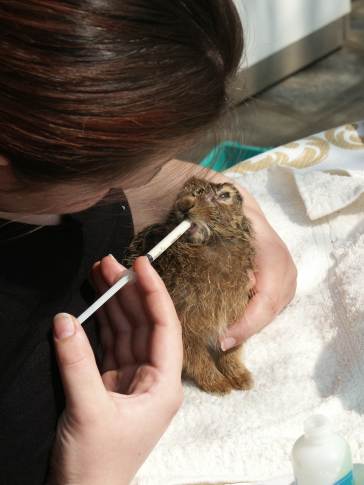|
|
For fostering a hare you will need the following:
|
-
Lactation milk for kittens
For the age of 1 to 7 weeks we needed three packages of Royal Canin's lactation milk
for kittens (~ 12$) and six cans of Gimpet's lactation milk (~ 6$).
-
Single-use syringes or hand-feeding bottle
We used 150 single-use syringes (Braun Omnifix, 1 ml). Unfortunately the syringes agglutinate very
fast from the milk and are then difficult to use. But compared to the hand-feeding bottle they have the
advantage that you can easier dose the milk. This prevents the milk from flowing into the hares' nose,
which can cause a deadly pneumonia.
A package of 100 syringes costs about 16$ in the pharmacy but you can also ask your family doctor
if he is willing to sell you a package for his purchase price, which is about 4$. If you have a a
very skittish hare that is difficult to feed, we recommend to use the hand-feeding bottle at the age of
2 weeks. They can suckle the milk for themselves or if they prefer to lick the milk from the teat, you
can put a little pressure on the bottle with your thumb to let the milk flow. So the hare does not need
to wait until you have refilled the syringe and it doesn't get impatient. We made very good experiences
the the bottle of Beaphar (some pet shops sell them), but you can also purchase bottles of the manufacturers
Gimpet or Karlie. But until the age of 2 weeks we recommend feeding the hare with syringes.

Hay, grass and dandelion
From the beginning on there should be hay in the cage where you house the hare because it will chew on
the stalks to train its teeth. You can buy hay in every pet shop, grass and dandelion can be plucked in
your garden or on the meadow. But please take care that you don't pluck it near the road or where many
dogs are walked.
Much time!
At the beginning a hare needs to be fed four times a day. In the wilderness its mother visits once or twice
a day for feeding, but her milk is more substantial than breeding milk for kittens. Depending on the hares'
state of health, one feeding can last from thirty minutes up to an hour. After a while the time may shorten
to a quarter hour if the hare drinks faster. The more weight it gains the less milk it needs, so after some
time you can reduce the feedings to three, two and one time(s) a day.
Medicine
What medication a hare needs depends on its state of health. Normally, the mother's milk provides the young
hares' immune system with the needed antibodies, so hares that are brought up by man are more prone to illnesses.
Hares as well as rabbits often suffer from a disease named Kokzidiose. This disease is caused by intestinal
parasites they cause severe diarrhoea and motion disorders. Hares that suffer from a Kokzidiose often look very
funny to an observer because they can't properly control their movements. But one would not guess that he is
looking at a seriously ill animal. To prevent this disease, every young hare should, as a precaution, be treated
with Bactrim (12$) and Bird Bene Bac (8$ per package).
As you can see, raising up a single hare is cost-intensive an time-consuming. You
should at least calculate an expenditure of about 100$ and 100 hours of attendance. Please do not underestimate
that fact!
|
 |
Hare, five weeks, being fed
|
|
|